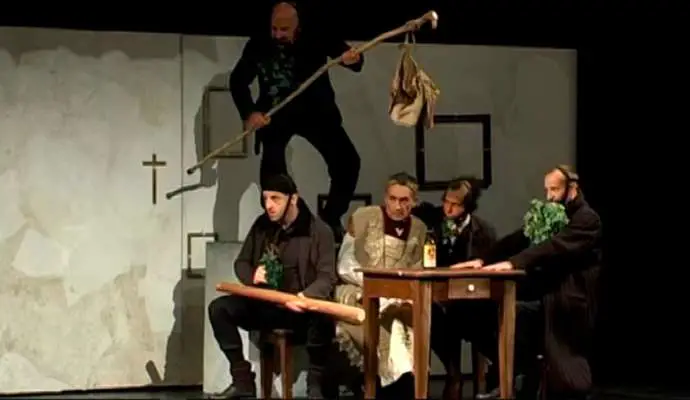January 30, 2019
In 1810 the French army seized and then executed a group of bandits called rokovnjači, who had previously attacked them in Črni Graben.
The first wave of this organised banditry in central Europe occurred during and after the 30-year War (1618-1648). The rokovnjači problem in what is today Slovenia was particularly pressing between the years 1808 – 1813 during the French occupation of these territories, when the bandits were even assisted by the Austrian court, and then after Austria regained its territories from Napoleon’s army the problem turned on her in an ever stronger fashion between the years 1825-1853. Rokovnjači were most numerous in Upper Carniola and in the Kamnik area, but could also be found in the Littoral.
The main causes of the phenomenon lay in the 1770 Maria Theresa decree which replaced her army of mercenaries with a 30-year period of military service for everyone poor and uneducated enough not to be able to avoid it, and the 1785 Joseph II abolition of serfdom, which freed the serfs not only from their masters but also from their land. These young deserters who were later joined by a variety of other social outcasts joined the ranks of rokovnjači, and lived lives revolved around hiding in the remote places of dark forests and their night hikes to towns and villages, where they begged, robbed, and terrorised the population.
The name Rokovnjači, sometimes also rokomavhi, comes from the folk belief that these bandits carried an arm (roka) of an unborn baby in their bags (mavha) which would then give them some magic powers such as make them invisible when in trouble or giving them a light in the dark that only them could see. It was believed that rokovnjači would cut babies out of pregnant ladies, chop their arms off and then dry them over a juniper berry wood fire, which is why no pregnant woman was allowed to wander around on her own. Belief in the magic of a child’s arm was not only present in the area of present-day Slovenia but, just like rokovnjači themselves, across Southern Germany and Austria as well. Jakob Grimm – the elder of the two famous brothers – describes in his book on German mythology (Deutsche Mithologie, 1835) the magic properties of the fingers of a pre-born baby; if they are set on fire the resulting flame would put everyone in a house to sleep, preventing them from waking up.
It was not against the interests of rokovnjači to be feared among the locals, who preferred to cooperate and support them in goods and information than to risk violent repercussions. On the other hand, they also tended to be helpful in poor farmers’ fights against the various forms of exploitation coming from the church, landowners and forceful conscriptions. Rokovnjači were well organised, which included a sort of a proto-Marxist ethics – that theft was justified by the ideas of equality and the right to survival. They also had their own secret language, which was a mix of various European ones, including German, Italian, Hungarian, Croatian and Slovenian. For example, “Ti lobov kumer'č, d'tej prefak upetov!” stood for “Ti slab človek, da ti je duhovnik ubežal!” (You bad man, let the priest escape you!).
In 1810 rokovnjači attacked and robbed a group of French soldiers in the Črni graben valley, which was a reason for the French army to retaliate. Not all of them were caught, but those that were were hung on today’s date in 1810. On February 12, Napoleon decided to establish gendarmerie stations in the most affected areas, known by the locals as “ravbarkomanda”.
In the third wave of banditry between the years 1825 and 1853, rokovnjači multiplied to the point the skirmishes began even among their own ranks. The affected population began to beg the authorities to do something about it. In 1850 the long awaited hunt of Austrian gendarme for the out-of-control bandits began. The new imperial decree, which reduced the military service to eight years in 1845 and again to six years in 1850, helped to reduce their ranks as well. No more was heard about rokovnjači after 1853.
A novel Rokovnjači (1881), written by Josip Jurčič and Janko Kersnik, continues to serve as an inspiration for various stage adaptations, one of them, a coproduction of the National Theatre of Nova Gorica and Prešeren Theatre Kranj, is embedded in the video below.






